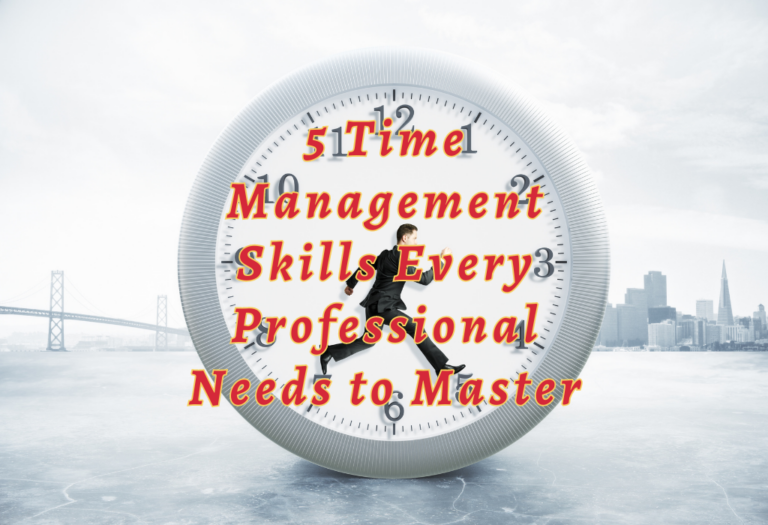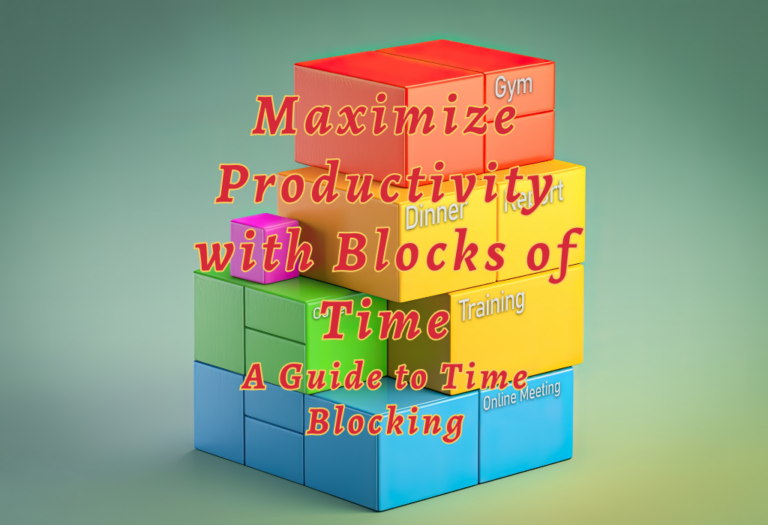4 Best Books on Time Management to Help You Get More Work Done
If time management is at the top of your list of areas you want to master and become more productive, you’re likely aware that it’s a skill that can be difficult to learn and even harder to master. Luckily for you, you don’t have to go it alone! There are countless resources available that can help you on your journey to becoming an expert time manager and making the most of your daily productivity.
In this blog post, we’ll share the four best books on time management – giving you the resources to become an expert time manager, enabling you to get more done in the same amount of time.

Introduction to Time Management Books
Time management books help us manage the relentless march of time. In today’s busy world, it is more important than ever to use tools that can help you optimize your workload and squeeze every minute out of your day. Time management books provide ideas, strategies, and ways of thinking that enable readers to gain control of their time, stay organized and productive, and maximize the efficiency of their workflows.
Many experts argue that time management books can be invaluable for busy professionals seeking to get more done in less time. The best ones offer practical advice on organizing tasks, developing better habits, and making more strategic decisions when managing your time. By providing insights from experienced productivity professionals and proven techniques to capitalize on little time, a good time management book can provide an effective solution for saving precious hours and days over a month or even a year.
On the other side of the argument, however, some people believe that time management books lack substance and do not deliver results. While they may present helpful tips and suggestions, one-size-fits-all advice cannot apply exceptionally well to individual situations. Furthermore, sorting through varying theories on complex topics such as self-discipline can be challenging work, hardening skeptics’ views that there is nothing truly useful within these books’ pages.
No matter which school of thought you support regarding the efficacy of time management books, there is no denying those titles properly chosen can benefit personal growth.
Best Time Management Books
Below we have mentioned the 4 top most time management books that can help you improve your schedule:
#1. “Getting Things Done” by David Allen
Regarding books on time management, no list is complete without “Getting Things Done” by David Allen. Published in 2001 and considered a life-altering classic, “Getting Things Done” transformed how many professionals and entrepreneurs approach their work day and organize their lives. It is one of the leading books on time management and goal-setting. Written by a renowned productivity consultant, this book focuses on developing an organized approach to increasing efficiency and productivity both in your personal life and at work. It emphasizes the importance of breaking down tasks into smaller, more manageable chunks to achieve success. Based on five practical steps of task management, the book draws on a mix of Eastern meditation practices and Western entrepreneurship principles.
While some people have disputed the effectiveness of the book’s methods due to a lack of empirical evidence, countless readers report that they have thoroughly benefitted from its advice and learned how to apply discipline to their daily workflow. They argue that it may need to be more transparent or more manageable for some readers. Additionally, they contend that it may not lead to increased productivity since mastering all components of this system can require so much effort.
Undoubtedly, “Getting Things Done” by David Allen is one of the most significant contributions to the field of time management. Advocates of this book have said that it encourages readers to be less anxious, clear their minds, and focus on executing tasks rather than worrying about them endlessly. They also highlight the benefits of proposed steps for implementing the system into everyday life. Additionally, these readers believe that following these steps leads to a more productive and efficient energy.
Overall, “Getting Things Done” may be best suited to individuals looking for an organized way to complete their daily tasks with maximum efficiency and productivity. It’s essential to consider both sides of this argument before deciding if this book is right for you.
#2. “Eat That Frog!” by Brian Tracy
“Eat That Frog!” by Brian Tracy is a best-selling book that provides readers with strategies to help them stay productive and organized in their daily lives. This book is excellent for individuals who could use tools to help them manage their time more efficiently.
One of the key takeaways from this book is the concept known as “Eat That Frog!” which encourages people to tackle their most difficult tasks first thing in the morning. According to Tracy, this will provide a sense of accomplishment and increase your motivation to complete other daily tasks. Those who adhere to this strategy can benefit from improved focus and reduced procrastination.
On the other hand, “Eat That Frog!” may not be suitable for everyone due to its inflexible approach. For example, if someone has an unpredictable work schedule that changes daily and week-to-week, it may be challenging to stick to any rigid routine. Therefore, relying on techniques from this book may not be practical for them.
In conclusion, “Eat That Frog!” by Brian Tracy is a powerful book for many people looking for tips on time management.
#3. “Successful Time Management” by Laura Vanderkam
In “Successful Time Management,” Laura Vanderkam offers readers a comprehensive and practical guide for taking charge of their own time. She emphasizes how failures in achieving set goals often stem from poor time management. Vanderkam provides readers with guidance and tips on optimizing different areas of life within their constrained 24-hour day.
The book helps readers identify when and how to say “no” to requests that may not be important or beneficial in the long run. In this regard, it can become a helpful tool for anyone tired of being overstretched due to commitments that add little or no value to their lives. By understanding the importance of rest and self-care, readers learn to create space to build meaningful habits with tangible outcomes.
On the other hand, some may argue that prioritizing too heavily means sacrificing time spent with loved ones and self-care activities. While this could be true in some cases, Vanderkam suggests approaching time management as an act of self-love. With a balanced approach, readers will learn to prioritize activities according to what is most important while finding space to make memories with those they cherish most.
Overall, Vanderkam’s “Successful Time Management” provides a roadmap for individuals striving to lead more meaningful lives by intentionally managing their hours.
#4. “The 4-Hour Workweek” by Timothy Ferriss
“The 4-Hour Workweek” by Timothy Ferriss is known as one of the best books on time management. On the surface, it challenges the long-held belief that success and hard work are directly correlated. The book’s central premise is that you can achieve much more in less time by working smarter, not harder.
This book encourages readers to look at different aspects of their lives and eliminate things that don’t provide much value. It promotes a minimalist lifestyle where tasks and commitments are evaluated based on whether they add value or distract from productivity. Ferriss includes guidance on how to simplify daily tasks so that more time can be devoted to personal hobbies and interests.
One of the most controversial parts of this book is its focus on entrepreneurship. Ferriss argues that it’s possible to create automated systems that make income even while on vacation. While many successful entrepreneurs have achieved excellent results with these strategies, there are varying levels of success for those who attempt them. It also requires preliminary research and planning, as well as lots of trial and error before any profitable systems start working.
At its core, “The 4-Hour Workweek” emphasizes the need for everyone to take control over their lives by simplifying tasks and achieving maximum efficiency so that they have more time to do the things they want. Whether reading a good book, trying out a hobby, or spending quality time with friends and family, time management strategies from this book can help you achieve balance in your life without sacrificing productivity.
Time Management Strategies from the Books
Time management strategies from books have become increasingly popular in recent years. While there is no single “correct” way to manage one’s time, a specific plan can prove effective for individuals and teams. The following books offer up some of the most widely used and practical techniques to achieve more with less effort:
These three books provide a glimpse into the various approaches to time management when faced with tight deadlines and burning goals. Whatever strategy resonates with you, it is crucial to consider the need for a balance between power and rest. With that said, it is now essential to focus on setting achievable goals before implementing any effective techniques for managing your time.
Strategies for Successful Long-Term Management
For successful long-term time management, it is essential to set realistic goals that balance power and prioritize tasks.
Focus On Your Goals
Having specific goals will help you to focus and manage your time effectively. Once you have identified what must be done, figure out how much time it will take to complete the task. To maximize efficiency, break the tasks into smaller steps and prioritize them. For example, if you are writing an essay for school, create a timeline for researching, drafting, and editing.
Developing goals can also motivate you if you set realistic and achievable objectives. Make sure your goals are attainable by writing them down, forming a timeline, and allocating enough time for completion. Unexpected events may occur, and there is no point in beating yourself up over delays; instead, adjust your schedule to account for any changes. Allowing flexibility with deadlines helps keep you focused on your goal while still making progress. Too rigid of a timeline can cause stress and a potential loss of enthusiasm toward completing the task.
On the other hand, you need a plan or direction when goal setting can lead to aimlessly pursuing projects that don’t contribute towards achieving your result. As tempting as it might be to start multiple projects at once due to feeling overwhelmed by an array of ideas – take an extra minute or two to reconsider and work through one task at a time until completion. Otherwise, you could find yourself constantly starting jobs without fully finishing them, which adds up over time with missed opportunities for momentum-building successes.
For better results, strive to write down SMART (Specific, Measurable, Achievable, Relevant & Time-bound) goals that focus on helping you reach your desired destination by breaking them down into defined milestones. This technique will keep you in check throughout the completion of the project through the use of micro-goals, keeping performance ready for evaluation at each step without being too bogged down by the overall picture at any point in time.
Prioritize Your Tasks
Prioritizing your tasks can make all the difference in getting the most important ones done. Taking stock of what must be accomplished makes it possible to identify which jobs deserve immediate attention and which may hold off for a day or two.
When deciding which tasks should take precedence, establish an order of importance by breaking down duties into three categories: high priority, medium priority, and low priority. This way, you prioritize the jobs that will most impact meeting short-term and long-term goals. The necessary activities to meet those goals can be given higher priority status. On the other hand, activities with little value should be de-prioritized.
It is also important to note that deadlines play a significant role in determining the priority level of a task. A project that requires completion within 24 hours would take precedence over one with more flexible terms. Similarly, processes continuous— such as daily invoicing -should receive top priority since they have to be done sometime or another.
Finally, when assessing tasks, remember to factor in all variables involved and consider how much time each job will require for completion. It might seem tempting to focus all attention on completing lengthy projects first, but more minor non-recurring charges often add up faster. They can leave you feeling overwhelmed if left unattended for too long.
By keeping these tips in mind, you can better organize your workload and prioritize your tasks accordingly. With proper categorization and planned execution of duties based on relative urgency, achieving greater efficiency with less stress and frustration throughout any given project is possible.
Actionable Systems for Mastering Your Approach to Time Management.
When it comes to time management, having a comprehensive and actionable system in place is essential. Actionable methods refer to organized strategies that allow people to track their daily goals and tasks and measure their productivity levels. Not only can these systems help people establish clear priorities, but they also provide an effective way of managing time and keeping track of critical activities.
Some popular actionable systems include the Eisenhower Matrix, which helps prioritize tasks based on their importance and urgency; the DISC system, which allows users to understand their work style and adjust the time and effort they put into certain activities accordingly; as well as the Getting Things Done (GTD) system developed by David Allen, which focuses heavily on task lists and goal setting.
Though different in approach, each strategy lays a clear framework for success. Time management experts recommend that people adopt an actionable system that best fits their specific needs, schedule, and motivation level to maximize productivity. On the other hand, establishing an effective method for tracking progress can be tedious and require too much effort. Readers need to decide what works best for them – no one knows how to manage their own time better than themselves. A solid time management strategy is critical to ensure success in all areas of life.
Valuable Tips on How to Put Together an Effective Time Management Plan
To help make the most of your time and achieve better results, some essential tips for success can be helpful.
Overall, understanding yourself and having realistic expectations are critical components for success when managing your time.
Frequently Asked Questions
Conclusion
When managing your time and tasks efficiently, choosing the right book can significantly impact a successful outcome. While there are numerous books on the topic, we have presented you with four that we found to be the best.
Each had its approach, yet all provided helpful guidance and insight into how one can better manage their time and get more done.
Reading reviews and peer recommendations can help you find the right book for your needs.
This article gave you a better idea of where to start when it comes to improving your time management skills.





